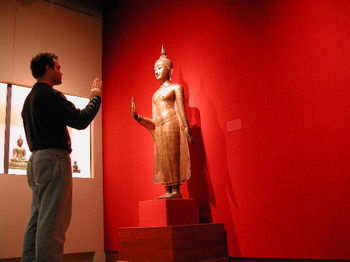 In this series of entries, we are exploring the Buddha’s basic teaching of the Noble Eight-Fold Path. In a previous entry, we focused on Right Effort, today, we’ll focus on Right Speech. Again, the use of the term “right” suggests the right-wrong dichotomy. This is not exactly what is meant. I prefer the term skillful or wise to describe these interfolding aspects of the Buddha’s teaching.
In this series of entries, we are exploring the Buddha’s basic teaching of the Noble Eight-Fold Path. In a previous entry, we focused on Right Effort, today, we’ll focus on Right Speech. Again, the use of the term “right” suggests the right-wrong dichotomy. This is not exactly what is meant. I prefer the term skillful or wise to describe these interfolding aspects of the Buddha’s teaching.
So, let’s explore Wise Speech. We are linguistic creatures; language is, perhaps, the defining characteristic of being human (there are scientific explorations and debates about the language capacities of other creatures, but that’s another discussion). We think in words, sentences, and ultimately stories. We communicate to others with words — directly and indirectly in writings such as blogs, books, and poems.
Words have power, great power. Words spoken in the confines of our minds and aloud are karma (action). That is, words are efficacious — they have effects. If we castigate ourselves, we’ll feel bad. If we castigate others, they’ll feel bad.
This fold of the eightfold path asks us to consider the power of words and to use them wisely, skillfully. Types of speech that may not be skillful include lying, gossiping, talking for the sake of talking.
Someone I know remembers the following aphorism from the Mickey Mouse Club: “If you don’t have anything nice to say, don’t say anything at all.” I think the Buddha would agree!
Wise speech in the workplace encourages us to embrace integrity, authenticity, and courage in what we say, what Susan Scott calls, “fierce conversations.” These fierce conversations are skillful — they say what needs to be said and are said in a way that is respectful. Authentic communication is not necessarily “nice” or “make nice” kind of communication. It might be direct and carry information that might be difficult for the person to hear, but necessary for them to hear.
There’s a lot of discussion now in the wake of Representative Giffords shooting about civility in political discourse. I find very little of what our politicians and pundits say to fit the definition of wise speech. They lie, distort, spin, take things out of context, promulgate bias, attack, smear, fear-monger, and prattle on.
Television is not a source for right speech. Commercials “lie” in similar ways to politician’s. They promote viewpoints that exploit emotions and distort facts to create a sense of lack that their product fills or create a sense of desire that their product gratifies.
We “lie” to ourselves when we engage in cognitive distortions. That is, when we jump to conclusions, blow things out of proportion, take things out of context and use them as evidence for our unworthiness.
There is no lexicon for Wise Speech, no set of words that are always right. Context matters. Intent matters. Wise Speech is a process and as human beings, central to our being as a work in progress. So think about the words you use and be mindful of their effects. Remember that thoughts are speech too.
If we want civility; we need to use speech with wisdom and skill.

